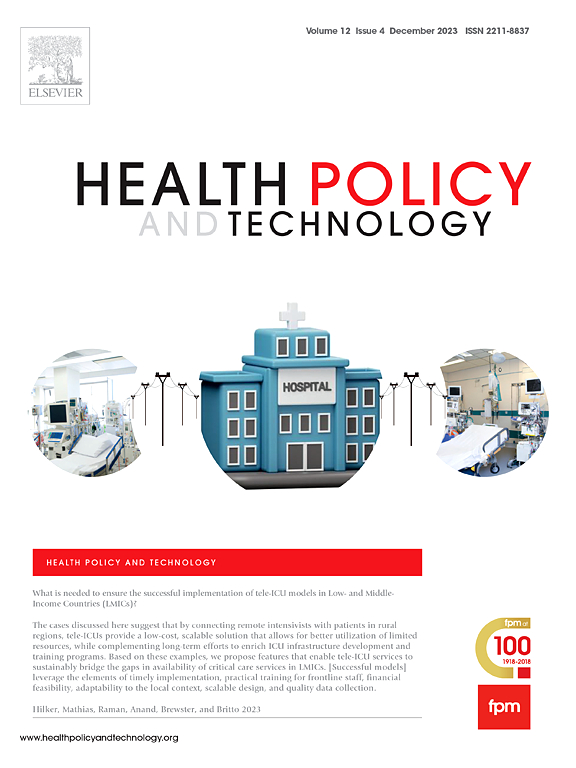Digital health services and rural healthcare access: Evidence from China
IF 3.7
3区 医学
Q1 HEALTH POLICY & SERVICES
引用次数: 0
Abstract
Objectives
Digital health technologies hold potential to address persistent healthcare access inequities in rural China by overcoming geographic and temporal barriers. Empirical evidence regarding their implementation efficacy remains essential to guide policy development in rural health services. This study investigates whether the adoption of digital health technologies improves healthcare accessibility among rural populations in China.
Methods
Using nationally representative data from 2021 Chinese Livelihood Status Survey, we employed a probit regression model to assess the effects of digital health on healthcare accessibility. Methodological rigor was ensured through comprehensive robustness testing, including dependent variable substitution, instrumental variable (IV) analysis addressing endogeneity concerns, propensity score matching (PSM) to mitigate selection bias, and sensitivity analyses for omitted variables. Additionally, heterogeneity analyses were conducted to assess differential effects of digital health across key demographic and socioeconomic subgroups within rural communities.
Results
Our findings indicate that digital health adoption significantly improves healthcare accessibility among rural residents by 4.5 %. This result remains consistent across all robustness tests. Heterogeneity analyses reveal substantially larger gains for marginalized subgroups, particularly elderly individuals, those with lower educational attainment, low-income households, and residents in underserved areas characterized by physician shortages or underdeveloped care systems. The positive effect is further strengthened in regions with more advanced broadband infrastructure.
Conclusions
Digital health significantly improves healthcare access for rural populations in China, supplementing traditional services in resource-scarce settings. These results support the need for nationally coordinated and contextually tailored digital health initiatives to effectively reduce disparities in both technological access and healthcare delivery.
数字医疗服务与农村医疗可及性:来自中国的证据
通过克服地理和时间障碍,数字卫生技术有望解决中国农村地区持续存在的医疗保健获取不平等问题。关于其执行效力的经验证据对于指导农村卫生服务的政策制定仍然至关重要。本研究调查了数字医疗技术的采用是否改善了中国农村人口的医疗可及性。方法利用具有全国代表性的2021年中国民生状况调查数据,采用probit回归模型评估数字健康对医疗可及性的影响。通过全面的稳健性测试确保了方法的严谨性,包括因变量替代、解决内生性问题的工具变量(IV)分析、缓解选择偏差的倾向得分匹配(PSM)以及对省略变量的敏感性分析。此外,还进行了异质性分析,以评估农村社区内关键人口和社会经济亚群体中数字健康的差异影响。结果数字医疗的采用使农村居民的医疗可及性提高了4.5%。这一结果在所有稳健性测试中保持一致。异质性分析显示,边缘化亚群体,特别是老年人、受教育程度较低的人、低收入家庭和以医生短缺或护理系统不发达为特征的服务不足地区的居民,获益更大。在宽带基础设施较先进的地区,积极效应进一步增强。结论数字健康显著改善了中国农村人口的医疗保健可及性,在资源稀缺地区补充了传统服务。这些结果支持有必要开展国家协调和因地制宜的数字卫生举措,以有效缩小技术获取和保健服务提供方面的差距。
本文章由计算机程序翻译,如有差异,请以英文原文为准。
求助全文
约1分钟内获得全文
求助全文
来源期刊

Health Policy and Technology
Medicine-Health Policy
CiteScore
9.20
自引率
3.30%
发文量
78
审稿时长
88 days
期刊介绍:
Health Policy and Technology (HPT), is the official journal of the Fellowship of Postgraduate Medicine (FPM), a cross-disciplinary journal, which focuses on past, present and future health policy and the role of technology in clinical and non-clinical national and international health environments.
HPT provides a further excellent way for the FPM to continue to make important national and international contributions to development of policy and practice within medicine and related disciplines. The aim of HPT is to publish relevant, timely and accessible articles and commentaries to support policy-makers, health professionals, health technology providers, patient groups and academia interested in health policy and technology.
Topics covered by HPT will include:
- Health technology, including drug discovery, diagnostics, medicines, devices, therapeutic delivery and eHealth systems
- Cross-national comparisons on health policy using evidence-based approaches
- National studies on health policy to determine the outcomes of technology-driven initiatives
- Cross-border eHealth including health tourism
- The digital divide in mobility, access and affordability of healthcare
- Health technology assessment (HTA) methods and tools for evaluating the effectiveness of clinical and non-clinical health technologies
- Health and eHealth indicators and benchmarks (measure/metrics) for understanding the adoption and diffusion of health technologies
- Health and eHealth models and frameworks to support policy-makers and other stakeholders in decision-making
- Stakeholder engagement with health technologies (clinical and patient/citizen buy-in)
- Regulation and health economics
 求助内容:
求助内容: 应助结果提醒方式:
应助结果提醒方式:


